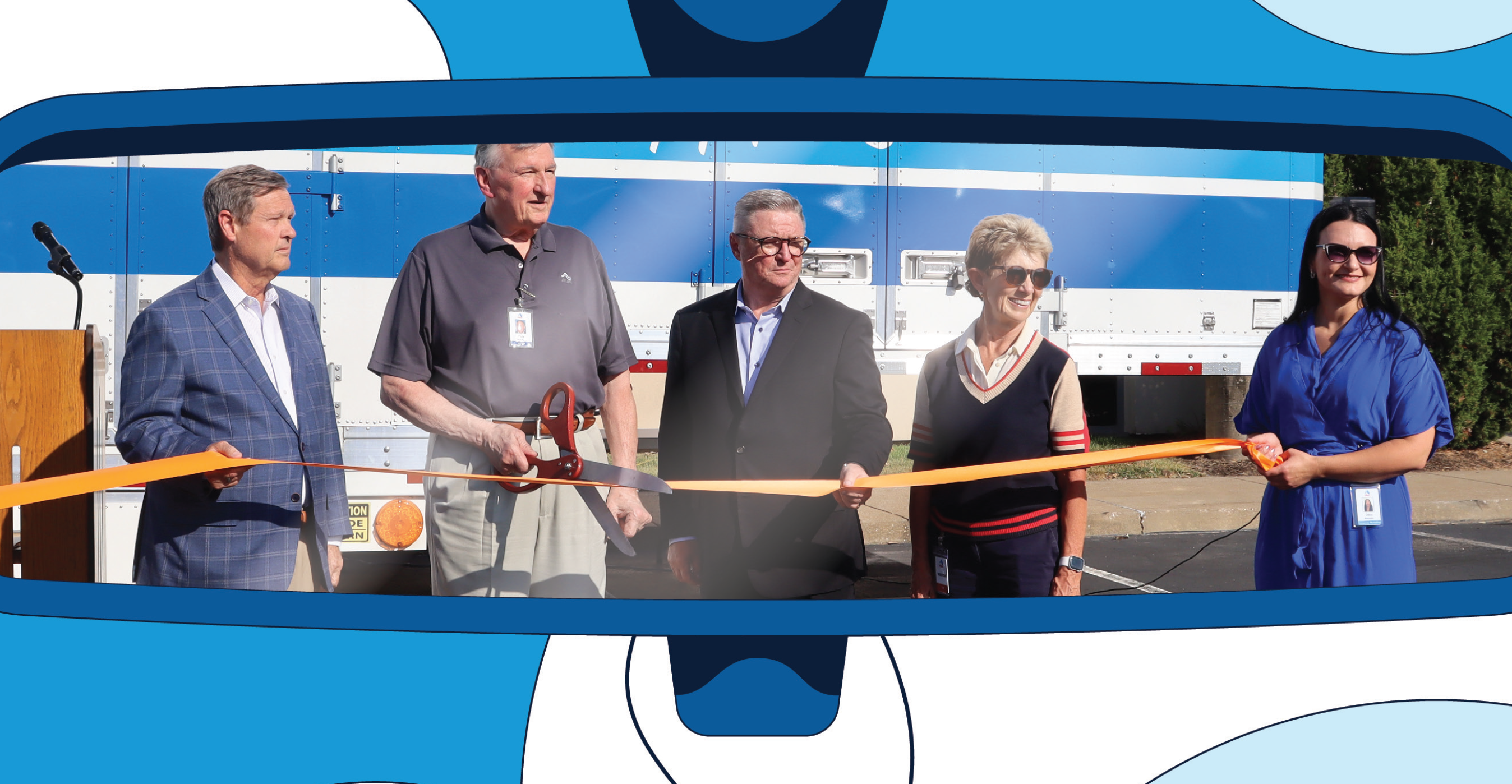Today, as Atlas ® celebrates 75 years, one of those original founding companies reflects on its heritage within the transportation industry and how its roots have grown stronger through its sustained partnership with the van line.

“In 1890, my great-grandfather moved from southern Illinois to Evansville, Indiana, to deliver goods being shipped on the Ohio River," says Shetler Moving & Storage President Tom Shetler, the current in a long line of family members who have helmed the company.
"Eventually, my great-grandfather settled in the household goods relocation business until he sold the company to my grandfather in 1942.” Shetler’s grandfather joined the Independent Movers & Warehouseman’s Association, where he met the 32 other original founders of what would become Atlas Van Lines.
The group all shared a common interest in developing a van line that would recognize a self-haul prerogative for booking Agents and sought to create a unified company that allowed the Agents the exclusive authority to book their own business on their own terms. And that’s exactly what they did.
“It is astounding when we look back at what it started as and what it has turned into,” says Jack Griffin, Chairman and CEO of Atlas® World Group. “Thirty-three Agents have multiplied into hundreds. What was then 48 states in the U.S. has now turned into a global footprint. And we cover all of it. Our growth and sustainability are truly worthy of extreme pride.”
As with any epic story, no tale about great success ever comes without the occasional chapter of hard times and harder fights to win the battle. In the late 1970s, Atlas ® went public, which Shetler says “looked like a good idea at the time—not so much looking back on it now.” The then-general manager of Atlas contacted an investor to purchase the outstanding shares and take over the company, leading a group of Agents to reach out to a “white knight” of sorts in the form of another outside investment firm.
That firm purchased the outstanding shares and gained a majority 80% stake in Atlas, leaving a remaining group of 10 Agents with 20% to keep their foot in the door on what they and their ilk had worked so hard to build.
“Four of the 10 Agent shareholders were appointed to the new Board of Directors at that time, and my father was fortunate to be selected as one of those members. Now, this was still not an ideal arrangement,” says Shetler. “The investment firm began selling off assets and increasing the Agent retention fees to the van line. So, my father and the other three members of the core Atlas family fought to buy our company back. This step was crucial for our Atlas family because it put us on a path of unimaginable success.”
After Atlas® came back into the hands of the Agents who had helped build and strategically nurture it into a successful company, it was again looking toward a major milestone—its 50th anniversary in 1998. From where we sit in the year 2023, it is hard to imagine that anyone at that time could have predicted the ways in which our world was about to transform, and at such a rapid pace.
In 1998, the internet was still a relatively new concept. America Online (“You’ve got mail!”) was king, and email was still a shiny new object that many people were adapting to using with regularity. Two years before its 50th year, Atlas® Van Lines became the first moving company in the U.S. to debut its very own consumer-facing website. To some, it did not seem at first like the huge step that it was. “I recall marketing being very proud of it, but I was a guy in operations and was like, ‘Okay, that’s cool. Moving on,’” says Ryan McConnell, President and COO of Atlas Van Lines.
.png)
McConnell has been with Atlas since 1994 and took a role as a dispatcher as his first job out of college. “To say we needed a website seemed kind of odd at the time. But now, when you take that first website we created and couple it with our strategy of staying focused on technological solutions, it allowed us to put a stake in the ground very early on to become the technological thought leader we are today for our entire industry. Quite frankly, that was the catalyst that thrust us forward in consumer lead generation and painted a path all the way up to where we are now. I am pleased our marketing team had that foresight.”
Looking back at the 50th anniversary issue of Atlas Amplifier®, leadership at the time did what leaders are good at doing—looking at the state of business and making strategic predictions for where they see the industry trending. At the time, leadership saw domestic mobility becoming static and, assuming it might stay that way, prescribed a focus on international relocation as the remedy for the future. Yet, as McConnell points out today, everything is cyclical. “The marketplace changes over decades. Today is not going to be tomorrow. Looking at domestic versus international, they each ebb and flow. We’ve seen that demonstrated greatly in the past few years because of the pandemic. As leaders, we just need to make sure we continue to reinvent what we look like in alignment with what the marketplace is demanding at any and every stage of the market. Thankfully, our Vision planning and strategies were adopted to be able to make sure we are nimble and dynamic in the market to capitalize on what our Agents and customers need at any given point in time,” says McConnell.
Considering that ebb and flow of mobility, it is no secret that the past few years have been tough on the transportation industry. But as the dust begins to settle, a way forward always emerges.
Like McConnell, Phil Wahl, President and COO of Atlas Logistics®, has seen Atlas grow and change over the years since he joined the company in 1989. Wahl came into the fold shortly after the Agent buyback (also as a dispatcher) and remembers that period being filled with a lot of excitement for what lay ahead. He shares McConnell’s sentiments that the more things change, the more things stay the same. “Things were evolving in 1998 when we looked at the state of our industry, and things are evolving today,” says Wahl. “A big trend in the last few years are shipment sizes. The moves are getting smaller. People are not as attached to their material belongings anymore, they are not at home as much, and when they move, they want it to be a simpler process. These are dynamics we are staying on top of. There is always going to be a need for a driver to show up and for that high level of customer service that we excel at—that does not change—but when we look at the direction our industry is going in, we must be able to provide the services that are required. And we are doing that now through solutions like containerization or digital options that our customers want and need in today’s market.”
Shetler agrees with Wahl, noting that actively responding to the market is paramount to continued success and evolution. “Our industry continues to be bombarded by disruptors who are chipping away at our margins. We need to continue to diversify our portfolio and develop more efficient methods of doing our core business of transporting household goods and other commodities from one point to the other to better control our destiny.”
As a self-classified “eternal optimist,” Griffin has high hopes for what the next 10, 50, or 75 years will look like for Atlas®, primarily because of the people who are here today and the ones waiting in the wings. Says Griffin, “I think the next generation or two are going to do an exceptional job of running this company and corporate America in general. I think that bodes very well for the transportation industry when we are looking at a new crop of smart and high-integrity operators in this space.”
It is easy to imagine that coming to fruition simply by looking at the generational lineage of the Agent network. Many within this diamond-certified group are third- and fourth-generation families who have passed down their respect for this business and the love of making a difference for other families as they make moves in their own lives. Today, they have collectively created a space where they can rely on and work with each other toward their common goal.
“We are certainly honored to be the grandfather of the Atlas family. However, a family only remains successful when everyone is working toward the success of the whole,” says Shetler. Moving forward, Atlas will keep doing what it has always done best while staying focused on how it can continuously improve itself. The advantage it has of having a solid structure in place and a global footprint gives it the ability to scale and maintain its position as an industry leader.
"One thing that has not and will not change is our culture, which is customer- and Agent-first,” says McConnell. “The hard work ethic of everyone here and the dedication they have back to the Atlas brand has huge value and is a special thing to witness.” Yes, the moving industry will continue to be challenged.
But as Griffin puts it, “Those among us who are committed, well-run, and well-managed with a strong balance sheet will continue to carve out great livelihoods for ourselves, our employees, our stockholders, and our Agent family.” “You never think you’re getting there fast enough,” concludes Wahl, “but when you look back, you realize just how far we’ve come.”




